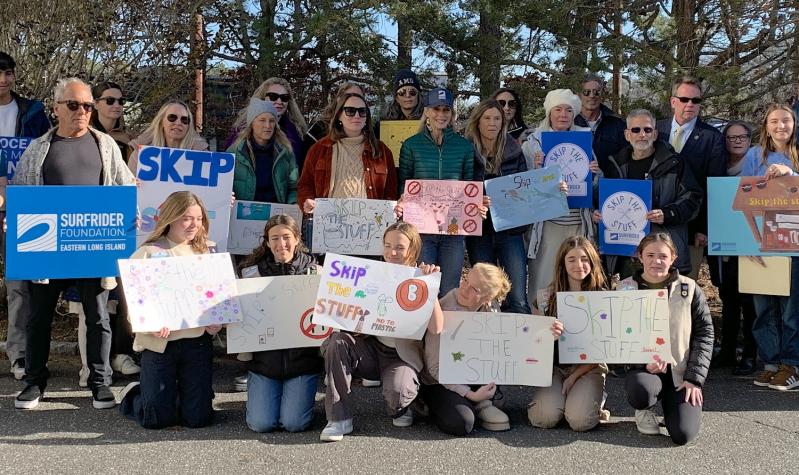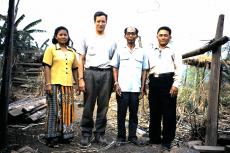Members of the Surfrider Foundation Eastern Long Island Chapter descended on the East Hampton Village Board meeting on Friday, pressing for legislation to support their Skip the Stuff initiative, which aims to limit plastic waste generated by takeout food orders.
A version of the ordinance passed in New York City earlier this year.
According to a press release from the foundation, Skip the Stuff is a nationwide campaign started by another nonprofit called Upstream Solutions, “to stop billions of unused straws, utensils, napkins, condiment packets, and other accessories that are included in takeout and delivery orders. A Skip the Stuff policy requires restaurants to stop automatically including these items — only providing them upon request.”
“This country has a very bad plastic problem,” said Christopher Minardi, the deputy mayor, at the meeting. “It’s in our waters, it’s causing cancers, and we’re not even using this stuff. I’d like to see the village embrace a stronger stance on plastic.”
Christine Capelli, the vice-chairwoman of the Surfrider foundation chapter, said in a slide presentation that “a staggering 79 percent of plastics ends up in landfills or in the environment.” An analysis of plastics gathered on beach cleanups showed that 67 percent comes from food-related items. By automatically including utensils, everyone pays a cost, she said: restaurants who must pay for these items and consumers “who are burdened with them.”
Several South Fork youth groups are supporting the effort to bring the legislation home to East Hampton. The Surfrider Clubs at East Hampton Middle School and the Ross School, the East Hampton High School Environmental Club, the Amagansett School, and Girl Scouts have all rallied against plastics.
Lola Garneau, a senior in East Hampton High School and a member of the Environmental Club, told the board the success of the campaign was up to them. “We’re the generation that will have to face the calamity of climate change.”
“When the children are educated, they are the ones who come home and tell their parents,” said Susan McGraw-Keber, an East Hampton Town Trustee. “I’m a certified rescue diver and so I see what’s going on in the ocean waters and it’s not pretty.”
Sanjay Pingle, a resident of Montauk and member of the Ocean Conservancy’s board of directors, said 36 billion disposable utensils are given out in the United States annually. By simply “flipping to an opt-in model from an opt-out model,” the amount of plastic being “burned, buried, or littered,” could be easily reduced.
“It’s rare that such a simple solution can affect a complex problem,” agreed Christina Blaustein, a Surfrider volunteer and former executive-committee member, at the meeting. The program would save restaurants money, she said, as they would need fewer plastic utensils.
Tom Cooper, who opened the Sweet Spot, a frozen-yogurt and candy shop on Newtown Lane, this spring, was concerned. “I’m probably the only person here who is going to be affected by this,” he said. “Nobody here is going to say we’re all for plastics — but I have to think about how to serve the customer.” He specifically used plastic straws over paper straws, he said, as 90 percent of paper straws have chemicals, as well. “I’m here to say think about what you’re doing. Can I not sell a bottle of water? You have to think about a pragmatic solution.”
It seemed, at times, that the discussion about drowning in plastics was also drowning in data. But one thing was as clear as a Poland Spring bottle: If oral reports at the meeting reflect our current reality, 100 percent of people have found plastic in strange places. Gloria Frazee of ReWild Long Island, who runs a compost program in collaboration with East Hampton Town, sorted through 3,000 pounds of food scraps last year and said plastic was the number-one contaminant. Brian Shaw, an East Hampton Town lifeguard, said that “without fail,” the village bioswales near Town Pond and behind the Methodist Church “have single-use plastic items in them.”
“Microplastics keep making the news each time they are found in a new area of the human body,” said Jenna Schwerzmann, the Surfrider chapter coordinator, who came armed with an additional 16 letters of support from residents. “We can’t beach clean our way out of the plastic problem.”
“I hear everyone loud and clear,” said Sarah Amaden, a village trustee and chairwoman of the village Business Committee, “but I also hear Tom Cooper.” She said education was key, and that the village needed to support mom-and-pop shops and collaborate with them to come up with a solution. She suggested the Surfrider Foundation work with business owners on an alternative supply list for restaurants.
“Our step is to create the legislation and get this moving,” said Mayor Larsen, who indicated that Mr. Minardi and Ms. Amaden would work with the village attorney to craft legislation, with the goal of introducing and passing it before summer.




